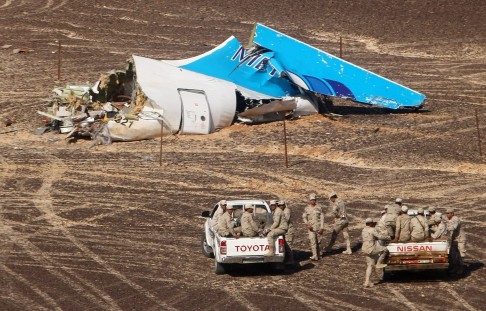Egypt airport officials reveal porous security as bomb theory surrounds Russian jet crash
Lapses exposed at Sharm el-Sheikh include poor baggage scanning
PUBLISHED : Sunday, 08 November, 2015, 11:19pm
UPDATED : Sunday, 08 November, 2015, 11:19pm
Associated Press in Cairo

Tourists queue for security checks at Sharm el-Sheikh.Photo: EPA
The airport at Egypt's resort of Sharm el-Sheikh has long seen gaps in security, including a key baggage scanning device that often is not functioning and lax searches at an entry gate for food and fuel for the planes, security officials at the airport said.
Security at the airport, and others around Egypt, have become a central concern as investigators probe the October 31 crash of a Russian plane 23 minutes after it left Sharm el-Sheikh, killing all 224 on board. The US and Britain have said the cause was likely a bomb planted on the flight, and Russia has halted flights to Egypt until security at airports is improved.
Seven officials involved in security at Sharm el-Sheikh airport, several for more than a decade, have revealed the holes in security. Several said the malfunctioning scanner had been noted in security reports to their superiors, but the machine was not replaced.
One of the officials, involved in security for planes, also pointed to bribe-taking by poorly paid policemen monitoring X-ray machines. "I can't tell you how many times I have caught a bag full of drugs or weapons that they have let through for €10 or whatever," he said.

The A321 plane of Metrojet from Sharm-el-Sheikh to St. Petersburg crashed in the Sinai, Egypt on October 31, killing all 224 people aboard. Photo: EPA
Egyptian President Abdel-Fattah el-Sisi has said British officials sent a security team to evaluate the airport 10 months ago, in cooperation with Egyptian officials, and were satisfied with the results.
A spokesman for Britain's Department of Transportation would not comment on any details of what the team found. But British Transport Secretary Patrick Mcloughlin suggested on Friday that screening of checked-in bags was insufficient, telling the BBC that it had imposed its own additional checks on its flights "because we weren't wholly satisfied with the way screening had been done."
All bags are put through a scanner as passengers enter Sharm airport, and carry-on bags go through a second machine at the gate before boarding.
But a scanner in the sorting area for checked-in bags often was not working, all the airport officials said.
One of the officials said the breakdowns in the 10-year-old CTX scanner were because operators didn't use it properly - "human stupidity," he said - rather than technical faults.
"I have seen people unplug it to save power," he said.
Another of the officials said the staff made sure the scanner was operating well enough whenever international experts came to review airport measures.
"We only care about appearances," he said. "Once they [higher-ups] hear someone is coming, suddenly everything gets fixed. ... We wish we had visits every day."
Several of the officials argued that it was "not that important" that the machine broke down because when it was working, it was only used to scan a sample of the bags, not all of them.
The scanner was one of at least five granted by Britain, and another scanner is used at Cairo's airport but only to scan luggage for flights to London and Paris, according to two security officials there. In Sharm el-Sheikh, the selective use of the scanner was even more arbitrary, three officials said.







